30 October 2023
![]() 7 mins Read
7 mins Read
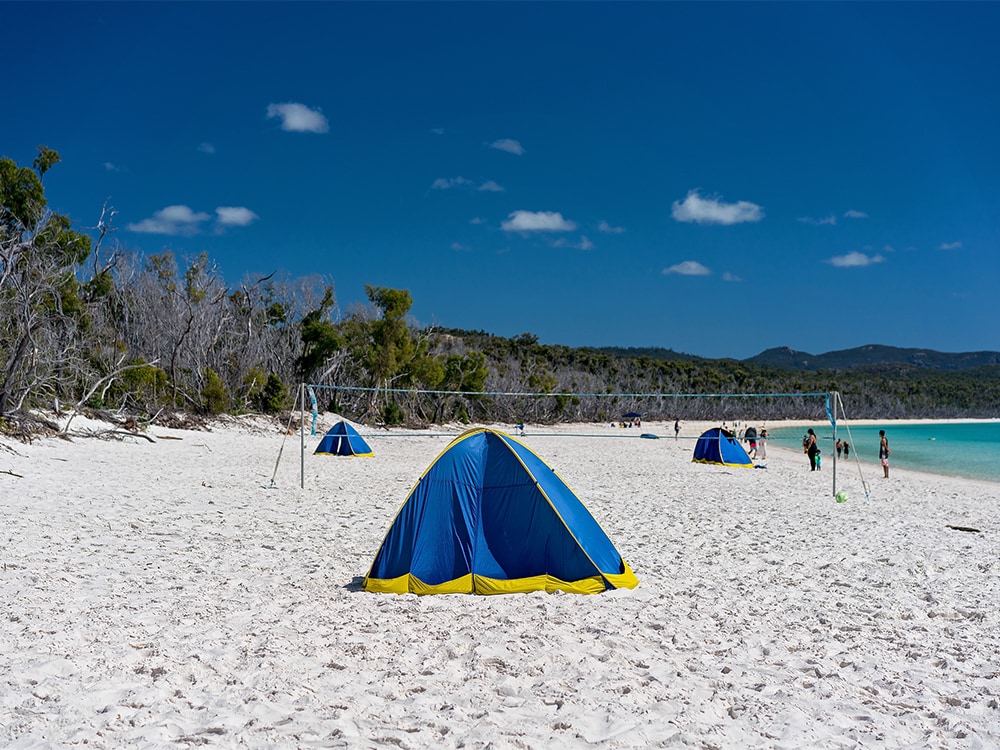
If you’re not sure what you’d like your camping adventure to look like, here are our picks of the most beautiful campsites for exploring the reef – plus, a few other tips too.
The key to any Great Barrier Reef adventure is preparation: book well in advance, particularly within peak periods because the number of campers on each island is usually capped.
Campsites usually open for bookings 12 months in advance to coincide with bookings for air and boat charters that also have long lead times. School holiday periods usually sell out shortly after bookings open, so get in quick.
All visitors require a camping permit and this needs to be displayed on your tent (potential fines apply if you don’t). Find out more about booking and camping fees here.
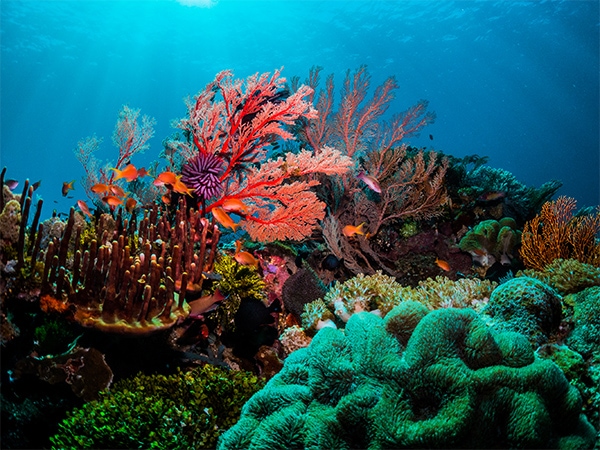
Protecting the Great Barrier Reef is more important than ever.
Looking after the Great Barrier Reef during your visit is simple: make sustainable choices, support the community you visit, protect the wildlife and the environment.
There are a few, small ways that campers can protect their surroundings and help preserve the beauty for future generations:
1. Camp in marked areas, ensuring you inspect your surroundings for nests and eggs before you set up or start an activity.
2. Check zoning information in advance for restrictions on fishing and collecting shells.
3. Avoid getting too close to seabirds, or any other wildlife. Disturb the animals as little as possible.
4. Stay on the walking tracks.
5. Leave your pets at home.
6. Be careful using lights and torches on the beaches during turtle breeding season (November to March).
7. Avoid feeding the seagulls – the population is increasing on many reef islands and threaten the survival of other birds.
8. Don’t dump plastic. This is illegal and can be fatal for aquatic animals and birds. Take your rubbish with you.
9. If there are no toilets, bury human waste below high tide level. Do not bury rubbish.
Near: Mission Beach
Sitting at the front door of Mission Beach is Dunk Island. It has been traditional sea country of the Bandjin and Djiru Aboriginal people for tens of thousands of years, and is a very approachable introduction to the Great Barrier Reef. It’s also a great place to pitch a tent.
There are eight campsites dotted around the island which feature flushing toilets and hot showers. There are also free barbeques to use and picnic tables.
To pass the time, hike to the summit Mt Kootaloo for seascape views, take day trips to the surrounding Outer Reef, or snorkel the underwater paradise from shore. No option will disappoint.
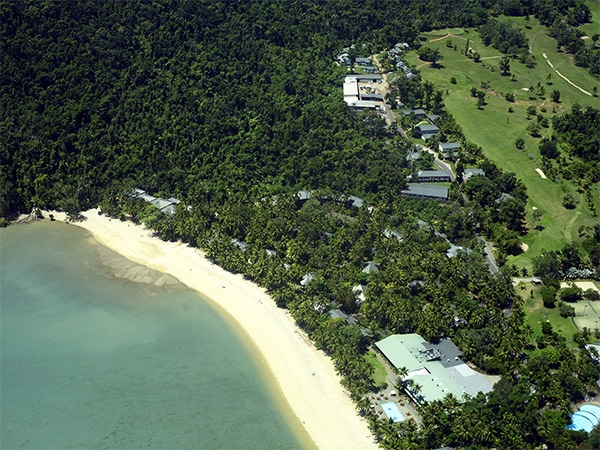
There are plenty of camping opportunities on Dunk Island.
Near: Cairns
The gorgeous (and often-overlooked) Fitzroy island forms part of the Great Barrier Reef Marine Park and is only a 60-minute ferry ride from Cairns.
The island is comprised of 97 per cent rainforest national park and is a haven for water sports and rainforest walks. You can even snorklet the Great Barrier Reef just off the shore. It’s the ideal spot for a tropical experience without the crowds.
There are 20 tent sites located right by the beach alongside an amenities block, pergola eating area and beachfront barbeques. Visitors are required to bring their own cooking equipment, but you’ll be more than rewarded with ample opportunities for swimming, snorkelling and adventure-fuelled fun for your efforts.
Near: Gladstone
Entirely uninhabited and accessible only by boat transfer from 1770, Lady Musgrave Island is the kind of desolate, deserted paradise that fills your 9-5 daydreams.
It has an 8 km circumference and is surrounded by 1192 hectares of reef. Clear waters give spectacular views of the underwater sea life and you can expect to see coral trout and turtles swim beside you.
The camping opportunities are as minimal as the population itself. With a maximum of 40 people allowed at a time, basic facilities are provided, including composting toilets and an emergency radio. All travellers are required to bring all the fresh drinking water and food they shall require, so this is one for those who are keen to get back to basics.
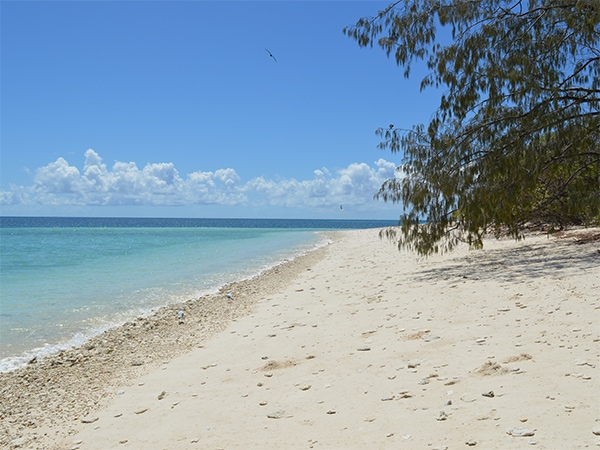
Get lost in paradise on Lady Musgrave.
Near: Townsville
A hop, skip and 20-minute ferry ride from Townsville will have you land smack bang on Magnetic Island.
The island is only 11 km in length, but home to hundreds of koalas and wallabies, more than 25 km of walking trails, and a plentiful supply of picturesque lookouts. It’s also located within the Great Barrier Reef Marine Park – don’t miss the self-guided underwater snorkel trail.
The only island camping facilities can be found at Bungalow Bay Koala Village. The site offers shady, secluded, powered and unpowered sites, which serve as the perfect base camp for exploring the island’s natural beauty.
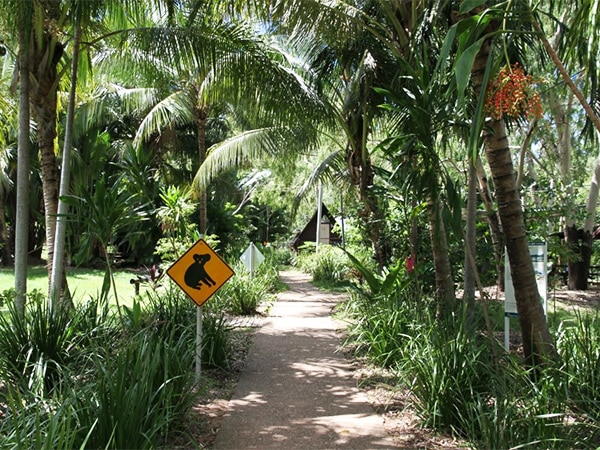
You’ll find Magnetic Island’s only camping grounds at Bungalow Bay Koala Village.
Near: Cairns
This is one of the most unique islands on the Great Barrier Reef. It is a remnant of a mountain range, which wouldn’t look out of place in the Greek Islands in the Aegean Sea. Rocky outcrops of granite; dry, sparsely vegetated hills – you’ll find it all on Lizard.
Most people arrive on the island via a small, 19-seater plane flown from Cairns airport. Once you’re here, there are five campsites set among the remote paradise. You’ll need to bring everything yourself, and be prepared to remove your own rubbish. There is a composting toilet, as well as picnic tables, a free gas barbeque and poles for erecting shade cloths.
You’ll feel like a true castaway here.
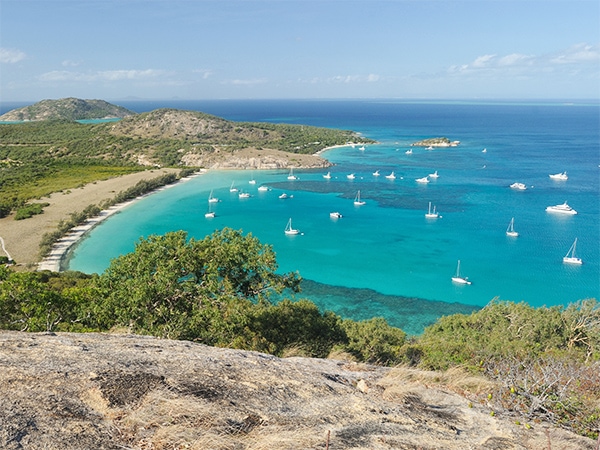
Spend your days on Lizard Island exploring the impossibly beautiful surrounds.
Near: Yeppoon
This tropical hideaway is a hub of turquoise waters, coral gardens and quiet beaches visited only by savvy campers.
Known as the back to basics, barefoot alternative, this is for those who want their choice of calm waters across 17 beaches. It’s also home to 90 bird species, and frequent turtle sightings.
Camping is exclusive to the Great Keppel Island Holiday Village, and there are two types on offer: standard sites or decked tents. Both grant full access to a camp kitchen, toilet and shower block as well as snorkelling gear. Decked tents are the premium glamping experience, featuring a small outdoor balcony, a bed, linen, lighting and fans.
However the standard camping sites shouldn’t be overlooked. There are six on offer, restricted to two person tents.
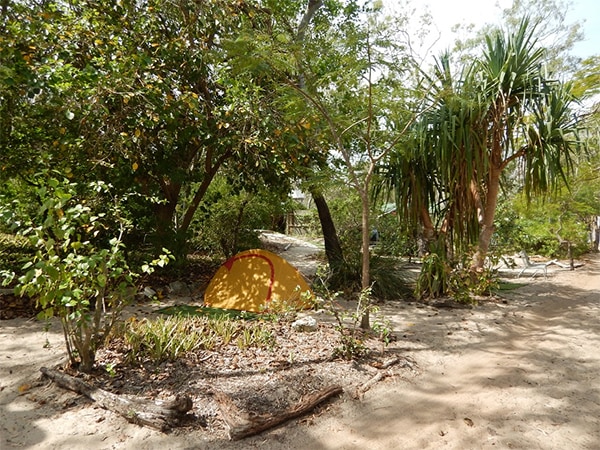
Pitch a tent at the Great Keppel Island Holiday Village.
Near: Bundaberg
In Woodgate, it’s all about long lazy laps along the shoreline, stand-up paddle-boarding above the turtles swimming below; or spotting curious wallabies who pop out of the bushland occasionally on the southern end. There’s only one road in and one road out of this 16-kilometre strip of sand. It’s also protected on both sides by national park.
The best way to experience this sleepy seaside locale, 35 kilometres south of Bundaberg, is by booking into the beachfront caravan park. This leafy, landscaped spot is directly across from the main beach, and seeks to accommodate campers, caravanners and those looking for a little something extra. There is a convenience store onsite, as well as a camp kitchen, laundry, two amenities blocks, Wi-Fi, and a café serving breakfast and lunch.
LEAVE YOUR COMMENT